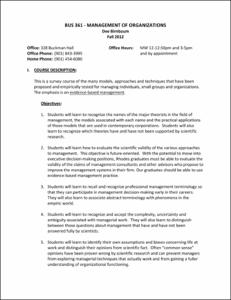Please use this identifier to cite or link to this item:
http://hdl.handle.net/10267/14994| Title: | BUS 361-01&02, Management of Organizations, Fall 2012 |
| Authors: | Birnbaum, Dee |
| Keywords: | Business, Department of;Syllabus;Academic departments;2012 Fall;Curriculum |
| Issue Date: | 24-Aug-2012 |
| Publisher: | Memphis, Tenn. : Rhodes College |
| Series/Report no.: | Syllabi CRN;13320 Syllabi CRN;13323 |
| Abstract: | This is a survey course of the many models, approaches and techniques that have been proposed and empirically tested for managing individuals, small groups and organizations. The emphasis is on evidence-based management. Objectives: 1. Students will learn to recognize the names of the major theorists in the field of management, the models associated with each name and the practical applications of those models that are used in contemporary corporations. Students will also learn to recognize which theories have and have not been supported by scientific research. 2. Students will learn how to evaluate the scientific validity of the various approaches to management. This objective is future-oriented. With the potential to move into executive decision-making positions, Rhodes graduates must be able to evaluate the validity of the claims of management consultants and other advisors who propose to improve the management systems in their firm. Our graduates should be able to use evidence-based management practice. 3. Students will learn to recall and recognize professional management terminology so that they can participate in management decision-making early in their careers. They will also learn to associate abstract terminology with phenomena in the empiric world. 4. Students will learn to recognize and accept the complexity, uncertainty and ambiguity associated with managerial work. They will also learn to distinguish between those questions about management that have and have not been answered fully by scientists. 5. Students will learn to identify their own assumptions and biases concerning life at work and distinguish their opinions from scientific fact. Often “common sense” opinions have been proven wrong by scientific research and can prevent managers from exploring managerial techniques that actually work and from gaining a fuller understanding of organizational functioning. 2 6. Students will be exposed to the many available approaches to managing work organizations to assist students in being more flexible, versatile and creative in solving management problems. 7. Students will learn to identify, analyze and remediate the motivation they face in their own lives. 8. Students will learn to identify the essence of leadership and the degree to which leadership influences organizational outcomes. 9. Students will learn to identify the historical origins of contemporary leadership theories. This will help students to evaluate the likely validity of new leadership theories as they emerge. 10. Students will learn to recognize different types of organizational structures. 11. Students will learn to anticipate the consequences of altering each element of organizational structure. 12. Students will learn to manage organizational metamorphosis as organizations grow and change. 13. Students will learn to apply different perspectives to manage and to model the interface between an organization and its environment. |
| Description: | This syllabus was submitted to the Office of Academic Affairs by the course instructor. Uploaded by Archives RSA Josephine Hill. |
| URI: | http://hdl.handle.net/10267/14994 |
| Appears in Collections: | Course Syllabi |
Files in This Item:
| File | Description | Size | Format | |
|---|---|---|---|---|
| 2012_fall_BUS_361-01_13320.pdf | 378.2 kB | Adobe PDF |  View/Open |
Items in DSpace are protected by copyright, with all rights reserved, unless otherwise indicated.